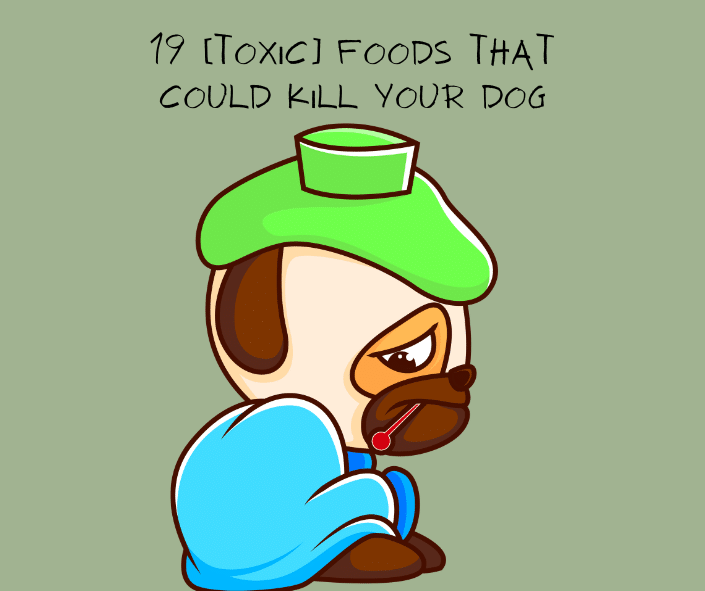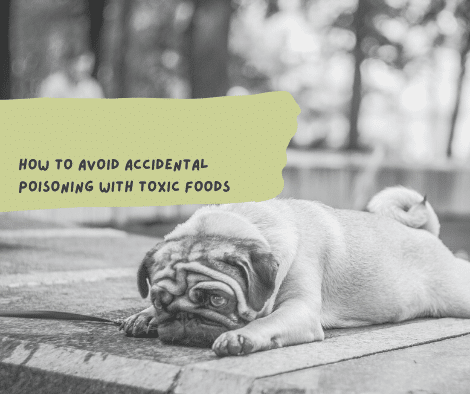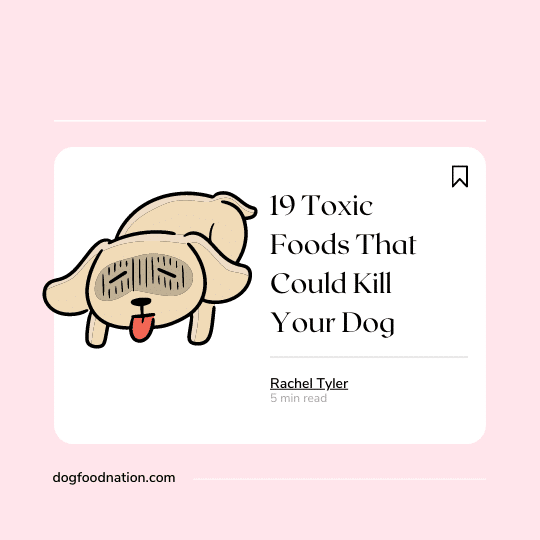19 Toxic Foods That Could Kill Your Dog
Reading Time: 6 minutes“It’s no surprise that pet owner wants the best for their beloved companion—and this becomes even more important when it comes to what our furry friends eat. Unfortunately, many common human foods and snacks can be highly toxic and dangerous to dogs if consumed. From onions and garlic to chocolate and avocados, understanding which items pose high risks is essential in being a responsible dog owner. To help you protect your pup from harm, we’re sharing 19 toxic foods that could kill your dog if they get their paws on them. Read on for more information!

Contents
The 19 toxic foods dog food list
1. People’s Food (Sugars, Fats, Salt)
2. Raw Eggs
3. Milk & Other Dairy Products
4. Carrots, Cucumber, & Celery
5. Caffeine & Coffee Grounds
6. Mushrooms
7. Peanuts, Peanut Butter, & Cashews
8. Yeast Doughs
9. Macadamia Nuts, Almonds, & Pistachios
10. Chocolate & Anything With Caffeine
11. Mushrooms
12. Nutmeg & Cinnamon
13. Onions, Garlic, Chives, & Leeks
14. Salt
15. Spicy Food
16. Sugar-Free Gum & Candy (Xylitol)
17. Tomatoes & Raw Potatoes
18. Tobacco
19. Foods That Are Safe For Dogs

How to avoid accidental poisoning with toxic foods
1. Learn how to identify potentially toxic plants and mushrooms
2. Properly store food, especially items like fish and shellfish, which may be more susceptible to spoilage
3. Check expiration dates before consuming any foods
4. Understand the symptoms of accidental poisoning, such as nausea, vomiting, and dizziness
5. Avoid eating wild berries or mushrooms without consulting a professional or an expert on the topic
6. Research methods for safely preparing potentially harmful foods, such as cooking and canning techniques
FAQ’s
What about grains, wheat, or quinoa?
Grains are a staple in many diets around the world. Wheat, in particular, is one of the most widely cultivated grains globally and a significant ingredient in many foods, including bread, pasta, and pastries. However, in recent years, more people have been turning to alternative grains like quinoa due to its numerous health benefits. Quinoa is high in protein and fiber and gluten-free, making it a popular choice for those with gluten intolerance or celiac disease. Whether you prefer wheat or quinoa, incorporating grains into your diet can provide you with various essential nutrients needed for a healthy lifestyle.
How do I know if my dog has been poisoned?
If you suspect your dog has ingested poison, look for symptoms immediately. Some signs of poisoning in dogs include vomiting, diarrhea, lethargy or hyperactivity, dilated pupils, loss of coordination, seizures, or difficulty breathing. Check your dog’s gums—if they are pale, bluish, or bright red, it likely indicates a problem. You should also note if your dog is drooling excessively or has burns around the mouth. If you observe any of these symptoms in your dog after it has potentially ingested a toxic substance, contact your veterinarian or pet poison control immediately for guidance and treatment.
What are some of the toxic foods that can be dangerous to dogs?
The most common toxic foods for dogs are chocolate, grapes and raisins, onions, macadamia nuts, salt, alcohol, caffeine, xylitol (an artificial sweetener in many sugar-free products), and raw fish. Any food that contains these ingredients should be avoided. Some dog treats may also contain potentially harmful ingredients or preservatives that could harm your pet. It is essential to always read labels before feeding your pet anything and consult with your veterinarian if you have any questions.
What are the symptoms of food poisoning in dogs?
The symptoms of food poisoning in dogs vary depending on the type of toxin ingested. Generally, signs include vomiting, diarrhea, abdominal pain, loss of appetite, lethargy, and dehydration. In severe cases, some dogs may experience seizures or even death. If you suspect your dog has eaten something poisonous or is exhibiting any of the above symptoms after eating a questionable item, contact your veterinarian immediately for advice and guidance.
How can I tell if my dog has eaten something toxic?
Observing its gums is one of the best ways to tell if your dog has eaten something toxic. If they are pale, bluish, or bright red, it likely indicates a problem. You should also note if your dog is drooling excessively or has burns around the mouth. If you observe any of these symptoms in your dog after it has potentially ingested a toxic substance, contact your veterinarian or pet poison control immediately for guidance and treatment.
What should I do if I think my dog has eaten something toxic?
If you believe your dog has ingested something toxic, contact your veterinarian or pet poison control (888-426-4435) as soon as possible. Depending on the type of toxin consumed, they may recommend inducing vomiting and giving the dog activated charcoal to help absorb any remaining toxins in its stomach. In more severe cases, intensive care may be necessary.
What foods should I avoid feeding my dog?
It is important to remember that dogs cannot eat many human foods, as their digestive systems are not designed to process them. Some of the most toxic foods for dogs include chocolate, grapes and raisins, macadamia nuts, onions, garlic, xylitol (a sugar substitute), avocados, and alcohol. Additionally, even fat trimmings from table scraps can cause pancreatitis in pets if consumed excessively. If you have questions about which foods are safe or unsafe for your dog, consult your veterinarian.
How can I prevent my dog from eating something toxic?
The best way to prevent your dog from eating something toxic is to keep potentially dangerous foods out of its reach and store all hazardous items in secure locations. Additionally, it is crucial to properly dispose of garbage and clean up after yourself when preparing food or drinking beverages that may be toxic for your dog. Finally, if you notice any strange behavior in your pet, seek a veterinarian’s assistance immediately.
What are the long-term effects of food poisoning in dogs?
If your dog has eaten something toxic, the long-term effects can be severe and even life-threatening. Depending on the type of toxin consumed, long-term results may include organ failure, neurological damage, digestive issues, and death. If you believe your pet has been poisoned, it is essential to seek veterinary care as soon as possible to minimize any potential long-term health risks.
How do I know if my dog has been poisoned?
If you suspect your dog has been poisoned, looking for signs of distress is best. Symptoms may include vomiting, diarrhea, loss of appetite, excessive drooling, and weakness or lethargy. If you notice any of these symptoms in your pet, seek medical help immediately.
What is the treatment for food poisoning in dogs?
The treatment for food poisoning in dogs depends on the type and severity of the toxin ingested. In most cases, your veterinarian will recommend fluids to flush out toxins, medications to help with nausea or vomiting, and dietary changes. If you suspect your pet has eaten something toxic, contact a vet immediately.
Are there any home remedies for food poisoning in dogs?
Unfortunately, home remedies are generally not recommended for food poisoning in dogs. Instead, keeping your pet hydrated and seeking veterinary care as soon as possible is vital. Home remedies can be dangerous if they contain toxins or interact with your dog’s medications.
What foods are toxic to dogs?
Many human foods are toxic to dogs, including chocolate, grapes and raisins, macadamia nuts, garlic and onions, alcohol, and xylitol. Additionally, some human medications can be hazardous when ingested by dogs. If you’re ever in doubt about a portion of food or medicine, always consult your veterinarian before giving it to your pet.
How vital keeping your pup happy and healthy is, but did you know that part of this includes taking care of their teeth?
That’s right, good oral hygiene is vital to your pet’s overall well-being. This means daily dental care, like brushing their teeth and providing them with dental chews or treats that help reduce plaque and tartar buildup. Regular checkups with the vet are also recommended to ensure your pup has healthy gums and clean teeth.
What can’t I feed my dog?
In addition to the toxic foods listed above, some human food can cause digestive issues in dogs. These include fatty and fried foods, dairy products, artificial sweeteners, raw eggs or meat, and excessive sugar or salt. To ensure your pup’s safety and health, stick to a diet specifically formulated for them and refrain from offering human food as treats.
What about grains, wheat, or quinoa?
Grains, wheat, and quinoa are generally safe for dogs to consume if adequately cooked. However, some grains can cause digestive issues in certain dogs. If you’re unsure if a particular grain is safe for your pup to eat, check with your veterinarian before offering it.
What foods can kill dogs?
Several foods can be toxic and even life-threatening when ingested by dogs. These include chocolate, grapes, alcohol, onion and garlic, avocado, coffee grounds, macadamia nuts, sugar-free treats with xylitol, raisins, and sultanas. Keeping these foods out of their reach is essential to ensure your pup’s safety.
Sources Cited
- https://www.petmd.com/nutmeg-safe-dogs
- https://www.aspca.org/pet-care/animal-poison-control/people-foods-avoid-feeding-your-pets
- https://www.aspca.org/pet-care/animal-poison-control
- 19 Toxic Foods That Could Kill Your Dog - June 9, 2023
- Owners of dogs are being cautioned due to the “very high” quantity of lead in dog food. - May 9, 2023
- BHA in Dog food? Is this even safe? - December 29, 2022

